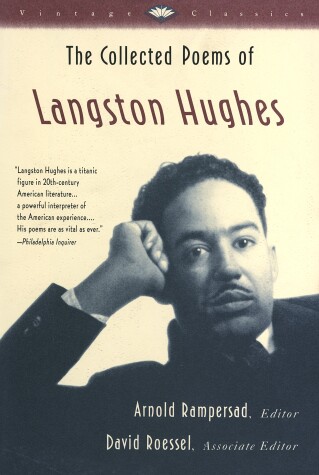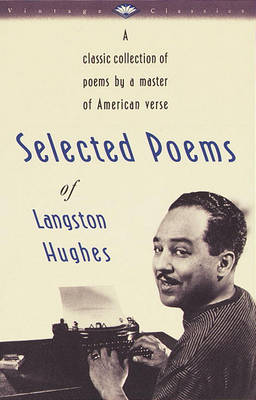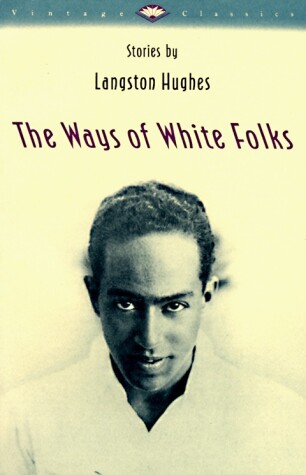Vintage Classics
1 primary work • 4 total works
From the publication of his first book in 1926, Langston Hughes was America's acknowledged poet of color, the first to commemorate the experience—and suffering—of Black Americans in a voice that no reader could fail to hear.
The poems in The Panther and the Lash are the last testament of a great American writer who grappled fearlessly and artfully with the most compelling issues of his time.
In this, his last collection of verse, Hughes's voice—sometimes ironic, sometimes bitter, always powerful—is more pointed than ever before, as he explicitly addresses the racial politics of the sixties in such pieces as "Prime," "Motto," "Dream Deferred," "Frederick Douglas: 1817-1895," "Still Here," "Birmingham Sunday." " History," "Slave," "Warning," and "Daybreak in Alabama."
The poems in The Panther and the Lash are the last testament of a great American writer who grappled fearlessly and artfully with the most compelling issues of his time.
In this, his last collection of verse, Hughes's voice—sometimes ironic, sometimes bitter, always powerful—is more pointed than ever before, as he explicitly addresses the racial politics of the sixties in such pieces as "Prime," "Motto," "Dream Deferred," "Frederick Douglas: 1817-1895," "Still Here," "Birmingham Sunday." " History," "Slave," "Warning," and "Daybreak in Alabama."
The definitive sampling of a writer whose poems were “at the forefront of the Harlem Renaissance and of modernism itself, and today are fundamentals of American culture” (OPRAH Magazine).
Here, for the first time, are all the poems that Langston Hughes published during his lifetime, arranged in the general order in which he wrote them. Lyrical and pungent, passionate and polemical, the result is a treasure of a book, the essential collection of a poet whose words have entered our common language.
The collection spans five decades, and is comprised of 868 poems (nearly 300 of which never before appeared in book form) with annotations by Arnold Rampersad and David Roessel. Alongside such famous works as "The Negro Speaks of Rivers" and Montage of a Dream Deferred, The Collected Poems includes Hughes's lesser-known verse for children; topical poems distributed through the Associated Negro Press; and poems such as "Goodbye Christ" that were once suppressed.
Here, for the first time, are all the poems that Langston Hughes published during his lifetime, arranged in the general order in which he wrote them. Lyrical and pungent, passionate and polemical, the result is a treasure of a book, the essential collection of a poet whose words have entered our common language.
The collection spans five decades, and is comprised of 868 poems (nearly 300 of which never before appeared in book form) with annotations by Arnold Rampersad and David Roessel. Alongside such famous works as "The Negro Speaks of Rivers" and Montage of a Dream Deferred, The Collected Poems includes Hughes's lesser-known verse for children; topical poems distributed through the Associated Negro Press; and poems such as "Goodbye Christ" that were once suppressed.
From the publication of his first book of poems, The Weary Blues, in 1926, Langston Hughes electrified readers and launched a renaissance in black writing in America.
The poems Hughes wrote celebrated the experience of invisible men and women: of slaves who "rushed the boots of Washington"; of musicians on Lenox Avenue; of the poor and the lovesick; of losers in "the raffle of night." They conveyed that experience in a voice that blended the spoken with the sung, that turned poetic lines into the phrases of jazz and blues, and that ripped through the curtain separating high from popular culture. They spanned the range from the lyric to the polemic, ringing out "wonder and pain and terror—and the marrow of the bone of life."
The poems in this collection were chosen by Hughes himself shortly before his death in 1967 and represent work from his entire career, including "The Negro Speaks of Rivers," "The Weary Blues," "Still Here," "Song for a Dark Girl," "Montage of a Dream Deferred," and "Refugee in America." It gives us a poet of extraordinary range, directness, and stylistic virtuosity.
“Langston Hughes is a titanic figure in 20th-century American literature . . . a powerful interpreter of the American experience.” —The Philadelphia Inquirer
The poems Hughes wrote celebrated the experience of invisible men and women: of slaves who "rushed the boots of Washington"; of musicians on Lenox Avenue; of the poor and the lovesick; of losers in "the raffle of night." They conveyed that experience in a voice that blended the spoken with the sung, that turned poetic lines into the phrases of jazz and blues, and that ripped through the curtain separating high from popular culture. They spanned the range from the lyric to the polemic, ringing out "wonder and pain and terror—and the marrow of the bone of life."
The poems in this collection were chosen by Hughes himself shortly before his death in 1967 and represent work from his entire career, including "The Negro Speaks of Rivers," "The Weary Blues," "Still Here," "Song for a Dark Girl," "Montage of a Dream Deferred," and "Refugee in America." It gives us a poet of extraordinary range, directness, and stylistic virtuosity.
“Langston Hughes is a titanic figure in 20th-century American literature . . . a powerful interpreter of the American experience.” —The Philadelphia Inquirer
A collection of vibrant and incisive short stories depicting the sometimes humorous, but more often tragic interactions between Black people and white people in America in the 1920s and ‘30s.
One of the most important writers to emerge from the Harlem Renaissance, Langston Hughes may be best known as a poet, but these stories showcase his talent as a lively storyteller. His work blends elements of blues and jazz, speech and song, into a triumphant and wholly original idiom.
Stories included in this collection:
"Cora Unashamed"
"Slave on the Block"
"Home"
"Passing"
"A Good Job Gone"
"Rejuvenation Through Joy"
"The Blues I'm Playing"
"Red-Headed Baby"
"Poor Little Black Fellow"
"Little Dog"
"Berry"
"Mother and Child"
"One Christmas Eve"
"Father and Son"
One of the most important writers to emerge from the Harlem Renaissance, Langston Hughes may be best known as a poet, but these stories showcase his talent as a lively storyteller. His work blends elements of blues and jazz, speech and song, into a triumphant and wholly original idiom.
Stories included in this collection:
"Cora Unashamed"
"Slave on the Block"
"Home"
"Passing"
"A Good Job Gone"
"Rejuvenation Through Joy"
"The Blues I'm Playing"
"Red-Headed Baby"
"Poor Little Black Fellow"
"Little Dog"
"Berry"
"Mother and Child"
"One Christmas Eve"
"Father and Son"



